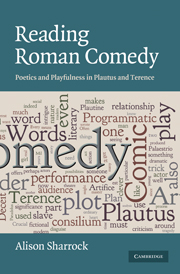36 results
Chapter 4 - Author and Identity
-
-
- Book:
- The Cambridge Critical Guide to Latin Literature
- Published online:
- 04 January 2024
- Print publication:
- 18 January 2024, pp 158-207
-
- Chapter
- Export citation
Internet-delivered cognitive behaviour therapy for post-traumatic stress disorder: a randomised controlled trial and outcomes in routine care
-
- Journal:
- Behavioural and Cognitive Psychotherapy / Volume 50 / Issue 6 / November 2022
- Published online by Cambridge University Press:
- 04 August 2022, pp. 649-655
- Print publication:
- November 2022
-
- Article
- Export citation
Introduction: Roman Comedy
-
-
- Book:
- The Cambridge Companion to Roman Comedy
- Published online:
- 30 March 2019
- Print publication:
- 04 April 2019, pp 1-14
-
- Chapter
- Export citation
Chapter 7 - Naso magister erat – sed cui bono?
-
-
- Book:
- Knowledge, Text and Practice in Ancient Technical Writing
- Published online:
- 27 April 2017
- Print publication:
- 19 April 2017, pp 112-137
-
- Chapter
- Export citation
Notes on contributors
-
-
- Book:
- The Cambridge Companion to Latin Love Elegy
- Published online:
- 18 December 2013
- Print publication:
- 21 November 2013, pp viii-xii
-
- Chapter
- Export citation
9 - The poeta-amator, nequitia and recusatio
- from Part III - The elegiac world
-
-
- Book:
- The Cambridge Companion to Latin Love Elegy
- Published online:
- 18 December 2013
- Print publication:
- 21 November 2013, pp 151-165
-
- Chapter
- Export citation
Contents
-
- Book:
- Reading Roman Comedy
- Published online:
- 18 December 2009
- Print publication:
- 24 September 2009, pp vii-viii
-
- Chapter
- Export citation
Preface
-
- Book:
- Reading Roman Comedy
- Published online:
- 18 December 2009
- Print publication:
- 24 September 2009, pp ix-xii
-
- Chapter
- Export citation
Bibliography
-
- Book:
- Reading Roman Comedy
- Published online:
- 18 December 2009
- Print publication:
- 24 September 2009, pp 290-307
-
- Chapter
- Export citation
4 - Repeat performance
-
- Book:
- Reading Roman Comedy
- Published online:
- 18 December 2009
- Print publication:
- 24 September 2009, pp 163-249
-
- Chapter
- Export citation
5 - Endings
-
- Book:
- Reading Roman Comedy
- Published online:
- 18 December 2009
- Print publication:
- 24 September 2009, pp 250-289
-
- Chapter
- Export citation
3 - Plotting and playwrights
-
- Book:
- Reading Roman Comedy
- Published online:
- 18 December 2009
- Print publication:
- 24 September 2009, pp 96-162
-
- Chapter
- Export citation
2 - Beginnings
-
- Book:
- Reading Roman Comedy
- Published online:
- 18 December 2009
- Print publication:
- 24 September 2009, pp 22-95
-
- Chapter
- Export citation
Index locorum
-
- Book:
- Reading Roman Comedy
- Published online:
- 18 December 2009
- Print publication:
- 24 September 2009, pp 313-321
-
- Chapter
- Export citation
Frontmatter
-
- Book:
- Reading Roman Comedy
- Published online:
- 18 December 2009
- Print publication:
- 24 September 2009, pp i-vi
-
- Chapter
- Export citation
1 - Art and artifice
-
- Book:
- Reading Roman Comedy
- Published online:
- 18 December 2009
- Print publication:
- 24 September 2009, pp 1-21
-
- Chapter
- Export citation
General index
-
- Book:
- Reading Roman Comedy
- Published online:
- 18 December 2009
- Print publication:
- 24 September 2009, pp 308-312
-
- Chapter
- Export citation

Reading Roman Comedy
- Poetics and Playfulness in Plautus and Terence
-
- Published online:
- 18 December 2009
- Print publication:
- 24 September 2009
In Memoriam Don Fowler - (S.J.) Heyworth, (P.G.) Fowler, (S.J.) Harrison (edd.) Classical Constructions. Papers in Memory of Don Fowler, Classicist and Epicurean. Pp. xvi + 368, ills. Oxford: Oxford University Press, 2007. Cased, £55. ISBN: 978-0-19-921803-5.
-
- Journal:
- The Classical Review / Volume 59 / Issue 2 / October 2009
- Published online by Cambridge University Press:
- 15 September 2009, pp. 463-465
- Print publication:
- October 2009
-
- Article
- Export citation
P. A. Miller (ed.): Latin Erotic Elegy: An Anthology and Reader. Pp. ix + 486. London and New York: Routledge, 2002. Paper. ISBN: 0-415-24372-6(0-415-24371-8 hbk).
-
- Journal:
- The Classical Review / Volume 53 / Issue 2 / October 2003
- Published online by Cambridge University Press:
- 13 April 2006, p. 489
- Print publication:
- October 2003
-
- Article
- Export citation

